UCH IN
Page 44
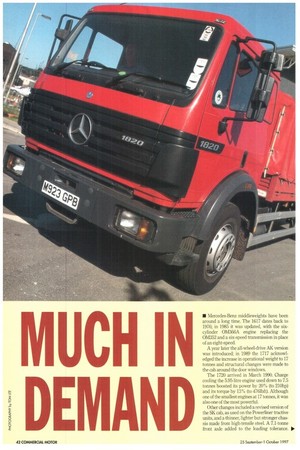
Page 46
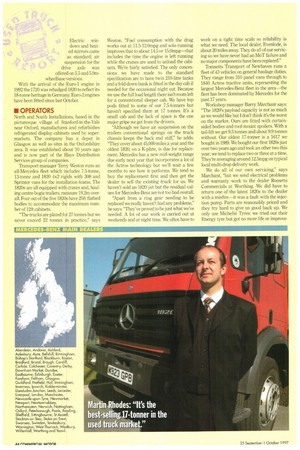
Page 47
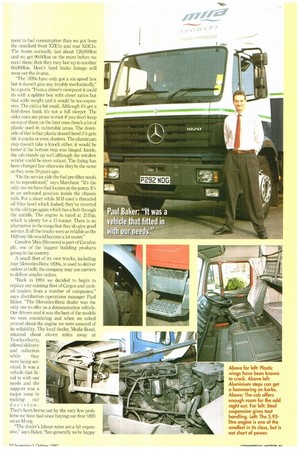
Page 48
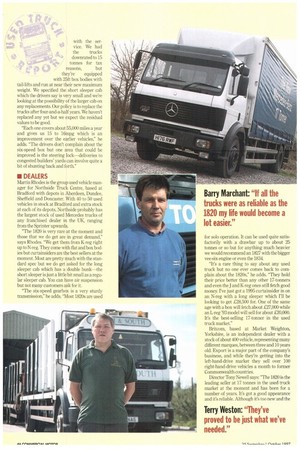
Page 49
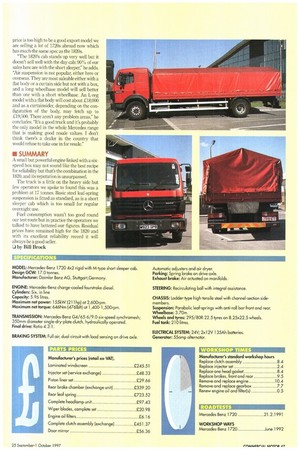
If you've noticed an error in this article please click here to report it so we can fix it.
• Mercedes-Benz middleweights have been around a long time. The 1617 dates back to 1976; in 1985 it was updated, with the sixcylinder 0M366A engine replacing the 0M352 and a six-speed transmission in place of an eight-speed.
A year later the all-wheel-drive AK version was introduced; in 1989 the 1717 acknowledged the increase in operational weight to 17 tonnes and structural changes were made to the cab around the door windows.
The 1720 arrived in March 1990. Charge cooling the 5.95-litre engine used down to 7.5 tonnes boosted its power by 20% (to 210hp) and its torque by 13% (to 4761bft). Although one of the smallest engines at 17 tonnes, it was also one of the most powerful.
Other changes included a revised version of the SK cab, as used on the Powerliner tractive units, and a thinner, lighter but stronger chassis made from high-tensile steel. A 7.1-tonne front axle added to the loading tolerance. 110
Electric win dows and heated mirrors came as standard; air suspension for the drive axle v'as offered on 5.5 and 5.9mwheelbase versions.
With the arrival of the Euro-1 engine in 1992 the 1720 was rebadged 1820 to reflect its 18-tonne heritage in Germany. Euro-2 engines have been fitted since last October.
• OPERATORS
North and South Installations, based in the picturesque village of Stanford-in-the-Vale near Oxford, manufactures and refurbishes refrigerated display cabinets used by supermarkets. The company has a depot in Glasgow as well as sites in the Oxfordshire area. It was established about 10 years ago and is now part of the Hays Distribution Services group of companies.
Transport manager Terry Weston runs an all-Mercedes fleet which includes 7.5-tonne, 13-tonne and 1820 4x2 rigids with 308 and Sprinter vans for the installation teams. The 1820s are all equipped with cranes and, hauling centre-bogie trailers, measure 19.2m overall. Four out of the five 1820s have 25ft flatbed bodies to accommodate the maximum number of 12ft cabinets.
"The trucks are plated for 27 tonnes but we never exceed 22 tonnes in practice," says
Weston. "Fuel consumption with the drag works out at 11.5-12.0mpg and solo running improves that to about 14.5 or 15.0mpg—that includes the time the engine is left running while the cranes are used to unload the cabinets. We're fairly satisfied. The only concessions we have made to the standard specification are to have twin 210-litre tanks and a fold-down bunk is fitted in the day cab if needed for the occasional night out. Because we use the full load length there isn't room left for a conventional sleeper cab. We have top pods fitted to some of our 7.5-tonners but haven't specified them at 17 tonnes. It's a small cab and the lack of space is the one major gripe we get from the drivers.
"Although we have air suspension on the trailers conventional springs on the truck chassis keeps the back end stiff," he adds. "They cover about 45,000 miles a year and the oldest 1820, on a K-plate, is due for replacement. Mercedes has a new mid-weight range due early next year that incorporates a lot of the Actros technology but we'll wait a few months to see how it performs. We tend to buy the replacement first and then get the dealer to sell the existing truck for us. We haven't sold an 1820 yet but the residual values for Mercedes-Benz are not too had overall.
"Apart from a ring gear needing to be replaced we really haven't had any problems," he says. "They've proved to be just what we've needed. A lot of our work is carried out at weekends and at night time. We often have to work on a tight time scale so reliability is what we need. The local dealer, Evenlode, is about 20 miles away. They do all of our servicing so we have never had an MoT failure and no major components have been replaced."
Tomsetts Transport of Newhaven runs a fleet of 43 vehicles on general haulage duties. They range from 310 panel vans through to 1840 Actros tractive units, representing the largest Mercedes-Benz fleet in the area—the fleet has been dominated by Mercedes for the past 17 years.
Workshop manager Barry Marchant says: "The 1820's payload capacity is not as much as we would like but I don't think it's the worst on the market. Ours are fitted with curtainsided bodies and roof-mount spoilers. With a tail-lift we get 9.3 tonnes and about 9.9 tonnes without. Our oldest 17-tonner is a 1617 we bought in 1989. We bought our first 1820s just over two years ago and took an other two this year; we tend to replace two or three at a time. They're averaging around 12.5mpg on typical local multi-drop delivery work.
We do all of our own servicing," says Marchant, "but we send electrical problems and warranty work to the dealer Rossetts Commercials at Worthing. We did have to return one of the latest 1820s to the dealer with a misfire—it was a fault with the injection pump. Parts are reasonably priced and they try hard to give us good back up. We only use Michelin Tyres: we tried out their Energy tyre but got no more life or improve
inent in fuel consumption than we got from the standard front XZEls and rear XDEls. The fronts normally last about 120,000km and we get 90,00km on the rears before we recut them; then they may last up to another 60,000km. Merc's hard brake linings still wear out the drums.
"The 1820s have only got a six-speed box but it doesn't give any trouble mechanically" he reports. "From a driver's viewpoint it could do with a splitter box with closer ratios but that adds weight and it would be too expensive. The cab's a bit small. Although it's got a fold-down bunk it's not a full sleeper. The older ones are prone to rust if you don't keep on top of them; on the later ones there's a lot of plastic used in vulnerable areas. The downside of that is that plastic doesn't bend if it gets hit: it cracks or even shatters. The aluminium step doesn't take a knock either, it would be better if the bottom step was hinged. Inside, the cab stands up well although the window winder could be more robust. The fixing has been changed but otherwise they're the same as they were 10 years ago.
"On the service side the fuel pm-filter needs to be repositioned," says Marchant. "It's the only one we have that locates at the pump. It's in an awkward position inside the chassis rails. For a short while M-I3 used a threaded oil filter howl which leaked; they've reverted to the old type again which has a bolt through the middle. The engine is rated at 211hp, which is plenty for a 17-tonner. There is no alternative in the range but they do give good service. If all the trucks were as reliable as the 1820 my life would become a lot easier."
Caradon Mira (Showers) is part of Caradon plc. one of the biggest building products group in the country.
A small fleet of its own trucks, including four Mercedes-Benz 1820s, is used to deliver orders in bulk; the company may use carriers to deliver smaller orders.
"Back in 1994 we decided to begin to replace our existing fleet of Cargos and invited tenders from a number of companies," says distribution operations manager Paul Baker. "The Mercedes-Benz dealer was the only one to offer us a demonstration vehicle. Our drivers said it was the best of the models we were considering and when we asked around about the engine we were assured of its reliability. The local dealer, Mudie-Bond, situated about eleven miles away at Tewkesbur y, offered delivery and collection
while they were being serviced. It was a vehicle that fitted in with our needs and the support was a major issue in making our decision. That's been borne out by the very few problems we have had since buying our first 1820 on an M-reg.
"The dealer's labour rates are a bit expensive," says Baker, "but generally we're happy with the service. We had the trucks downrated to 15 tonnes for tax reasons, but they're equipped with 25ft box bodies with tail-lifts and run at near their new maximum weight. We specified the short sleeper cab which the drivers say is very small and we're looking at the possibility of the larger cab on any replacements. Our policy is to replace the trucks after four-and-a-half years. We haven't replaced any yet but we expect the residual values to be good.
"Each one covers about 55,000 miles a year and gives us 15 to 16mpg which is an improvement over the earlier vehicles," he adds. "The drivers don't complain about the six-speed box but one area that could be improved is the steering lock—deliveries to congested builders' yards can involve quite a bit of shunting back and forth."
• DEALERS
Martin Rhodes is the group used vehicle manager for Northside Truck Centre, based at Bradford with depots in Aberdeen, Dundee, Sheffield and Doncaster. With 40 to 50 used vehicles in stock at Bradford and extra stock at each of its depots, Northside probably has the largest stock of used Mercedes trucks of any franchised dealer in the UK, ranging from the Sprinter upwards.
"The 1820 is very rare at the moment and those that we do get are in great demand," says Rhodes. "We get them from K-reg right up to N-reg. They come with flat and box bodies but curtainsiders are the best sellers at the moment. Most are pretty much with the standard spec but we do get asked for the long sleeper cab which has a double bunk—the short sleeper is just a little bit small as a regular sleeper cab. You can have air suspension but not many customers ask for it.
"The six-speed gearbox is a very sturdy transmission," he adds. "Most 1820s are used for solo operation. It can be used quite satisfactorily with a drawbar up to about 25 tonnes or so but for anything much heavier we would recommend an 1827 with the bigger vee-six engine or even the 1834.
"It's a rare thing to say about any used truck but no one ever comes back to complain about the 1820s," he adds. "They hold their price better than any other 17-tonners and even the J and K-reg ones still fetch good money. I've just got a 1995 curtainsider in on an N-reg with a long sleeper which I'll be looking to get £28,500 for. One of the same age with a box will fetch about £27,000 while an L-reg '93 model will sell for about £20,000. It's the best-selling 17-tonner in the used truck market."
Britcom, based at Market Weighton, Yorkshire, is an independent dealer with a stock of about 400 vehicle, representing many different marques, between three and 10 years old. Export is a major part of the company's business, and while they're getting into the left-hand-drive market they sell over 100 right-hand-drive vehicles a month to former Commonwealth countries.
Director Tony Newell says: "The 1820 is the leading seller at 17 tonnes in the used truck market at the moment and has been for a number of years. It's got a good appearance and it's reliable. Although it's too new and the price is too high to be a good export model we are selling a lot of 1720s abroad now which has much the same spec as the 1820s.
The 1820's cab stands up very well but it doesn't sell well with the day cab: 90% of our sales here are with the short sleeper," he adds. "Air suspension is not popular, either here or overseas. They are most saleable either with a flat body or a curtain side but not with a box, and a long wheelbase model will sell better than one with a short wheelbase. An L-reg model with a flat body will cost about £18,000 and as a curtainsider, depending on the configuration of the body, may fetch up to £19,500. There aren't any problem areas," he concludes. "It's a good. truck and it's probably the only model in the whole Mercedes range that is making good resale values. I don't think there's a dealer in the country that would refuse to take one in for resale."
• SUMMARY
A small but powerful engine linked with a sixspeed box may not sound like the best recipe for reliability but that's the combination in the 1820, and its reputation is unsurpassed.
The truck is a little on the heavy side but few operators we spoke to found this was a problem at 17 tonnes. Basic steel leaf-spring suspension is fitted as standard, as is a short sleeper cab which is too small for regular overnight use.
Fuel consumption wasn't too good round our test route but in practice the operators we talked to have bettered our figures. Residual prices have remained high for the 1820 and with its excellent reliability record it will always be a good seller.
El by Bill Brock
















































































































